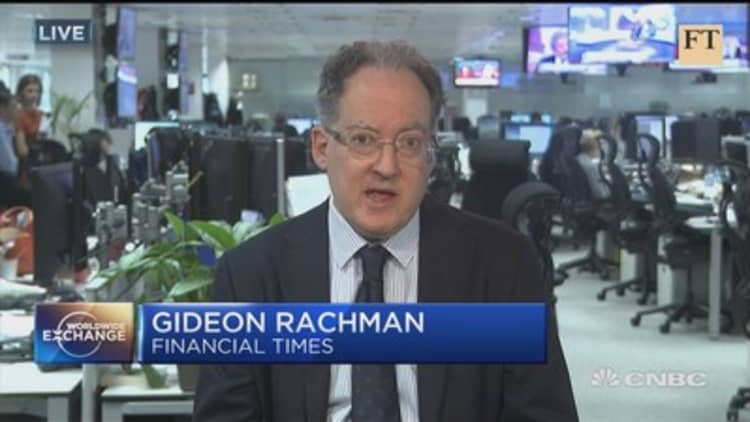Score one for Frankfurt.
With Britain locked in negotiations with the European Union over their post-"Brexit" relationship, the financial companies that dominate London's economy have forged ahead, eager to ensure they can continue to serve clients across the Continent. That has set other European cities scrambling to win a slice of the business that the British capital has long kept for itself.
The American banking giant Citigroup is taking a step toward reducing its dependence on London and will open a second trading hub in Frankfurt, said a person familiar with the bank's plans, who was not authorized to speak publicly about them and so spoke anonymously. The bank has had an operation in Frankfurt for decades, but it would expand its business there with this latest decision.
The development is largely symbolic, with a relatively small number of staff members in London expected to move to Germany. But it is another trickle of job losses that some British business and political leaders fear could turn into a flood in the coming months and years, as the full picture of the nation's future trading relationship with the European Union becomes clear.
Britain's membership in the 28-nation bloc has bolstered London's position as a global financial hub in part because European rules allow "passporting," under which a banking license in a single member-state allows a lender to work throughout the European Union.
But it is unclear whether Britain will be able to retain that access. Other questions affecting banks also remain unanswered, including whether European citizens will be able to continue to live and work in Britain, and if so, under what sort of visa.

The European Union could also restrict the clearing outside the bloc of complex financial contracts known as derivatives when they are denominated in euros, further sidelining London.
While most financial companies have said they would prefer to stay in London — home to some of the world's biggest financial markets and a wide variety of support industries like accountants and lawyers — they also must ensure they can continue to operate across the European Union.
Citi's decision shows how financial services companies are trying to strike that balance.
The bank employs about 19,000 people in the European Union, including around 6,000 in London. A vast majority of its investment banking and trading jobs in London will remain in place, according to the person. But the bank will obtain a broker dealer license in Frankfurt so it can continue trading and offering investment banking services across the European Union.
The jobs that may shift to Frankfurt form a small percentage of the overall figures. And while other financial companies have announced plans to move employees or to make new hires in Dublin, Frankfurt, Paris and even Luxembourg, most of those plans have also involved relatively few people.
Still, that has not stopped cities on the Continent — particularly Frankfurt and Paris — from making an aggressive sales pitch to business leaders, hoping to eventually lure tens of thousand of workers.
More from the New York Times:
Theresa May Offers 'Great Repeal Bill,' and Opponents Promise 'Hell'
U.K. Plan to Quit European Nuclear Treaty Stirs Alarm
Trump Persists on Health Bill, Urging Senators to Revive It
Britain has started the clock on leaving the European Union, and will be out of the bloc by March 2019. Here is how "Brexit" has affected business so far.
The lobbying group Europlace Paris said this year that it hoped to attract as many as 20,000 financial jobs, and the new president of France, Emmanuel Macron, has pledged to change labor laws to make the country more economically competitive.
Frankfurt, despite being viewed by some as a sleepier city, has at least one definite advantage: It is the home to the European Central Bank, the region's chief banking regulator.
Stefan Winter, the chairman of the industry group Association of Foreign Banks in Germany, told the newspaper Welt am Sonntag last month that Frankfurt could add 3,000 to 5,000 jobs in the next two years as a result of Britain's leaving the bloc.
Frankfurt Main Finance, another lobbying organization, has estimated that as many as 10,000 new jobs could move to the city over the next five years.
In a news release after reports that Citigroup was planning to move the jobs to Germany, Frankfurt Main Finance said the city was in the "pole position" to win banking business from London.
"Noted for its strong economic and political stability, Frankfurt and the region offer a top infrastructure, competitively priced and plentiful modern office space, a deep talent pool and an extremely high quality of life," Frankfurt Main Finance said.

And while much appears unclear, one thing is certain: Banks in London are pushing ahead with contingency plans.
The British lender Barclays said last week that it was in talks with Irish regulators to expand the license of its Barclays Bank Ireland subsidiary to continue to serve European Union clients, while HSBC has said it could move as many as 1,000 people to Paris.
The American International Group and other insurers have picked Luxembourg for their European hubs, while the insurance marketplace Lloyd's of London has settled on Brussels for its new European Union subsidiary.
But Citigroup will not find itself alone in Germany.
The Japanese companies Daiwa Securities, Nomura and the Sumitomo Mitsui Financial Group have said they will set up outposts in Frankfurt. Standard Chartered, which is based in Britain but generates much of its income in Asia, has said it was in discussions with regulators about opening a subsidiary in Frankfurt.
Richard Gnodde, the head of Goldman Sachs in Europe, told the newspaper Frankfurter Allgemeine Zeitung last month that the investment bank could double its staff in the city.

